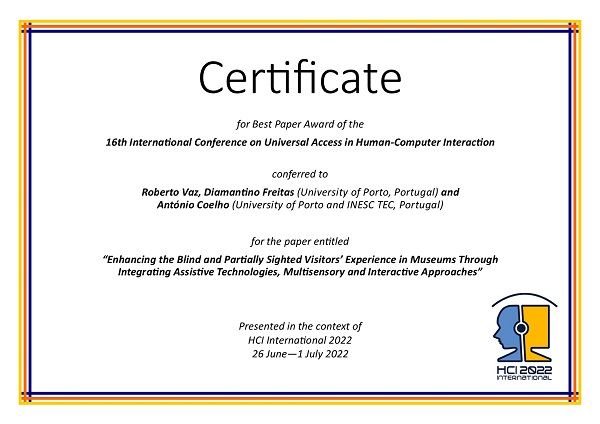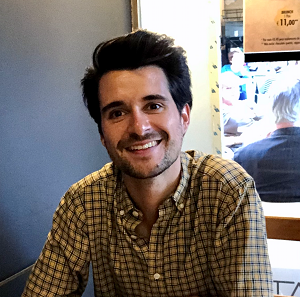
Certificate for Best Paper Award of the 16th International Conference on Universal Access in Human-Computer Interaction
The award has been conferred to
Roberto Vaz, Diamantino Freitas (University of Porto, Portugal) and
António Coelho (University of Porto and INESC TEC, Portugal)

Roberto Vaz
(presenter)
for the paper entitled
"Enhancing the Blind and Partially Sighted Visitors’ Experience in Museums Through Integrating Assistive Technologies, Multisensory and Interactive Approaches"
Presented in the context of
HCI International 2022
26 June—1 July 2022
Paper Abstract
"Despite the growing concern and several efforts to make museums accessible to visually impaired publics, their participation in these institutions is still limited, frustrating their desired inclusion. These visitors often experience multiple barriers in museological environments, and there is a lack of assistive technologies to promote access to exhibits, allow contextual information, and support mobility and orientation inside museum spaces.
This paper presents the accessible, interactive, and multisensory exhibition “Mysteries of the Art of Healing”, which is organized in ten moments of an on-site visit to a history and science museum in Portugal, mediated by a set of technological solutions: an interactive 3D layout plan of the museum, seven high-fidelity prototypes of accessible interactives with thirteen 3D replicas, and one mobile application that acts as an assistive navigation guide during the entire visit. For its development, several principles proposed by a group of 72 blind and partially sighted persons to improve their autonomy during visits to museums were taken into account, namely: to provide sensory, intellectual, and physical access throughout the entire museum experience.
Evaluation results with 25 visually impaired participants revealed the applicability of the developed solutions within this museum visit context, and global satisfaction results showed to be very positive and correlated to four variables: pleasantness of interacting with digitally fabricated objects, entertainment provided by the ten experiences, interaction with the developed accessible interactives, and pleasantness regarding the handling of manually fabricated replicas."
The full paper is available through SpringerLink, provided that you have proper access rights.